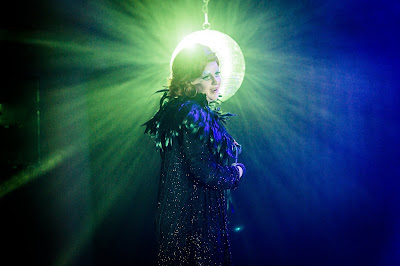 |
| Handel's Alcina - Royal Academy Opera - photo Robert Workman |
Reviewed by Robert Hugill on Oct 24 2016
Star rating:
Handels'opera re-invented in a brilliantly engaging performance
 |
| Meinir Wyn Robert - Handel's Alcina - photo Robert Workman |
The Round Chapel, a former United Reformed Church, was built in 1871 and taken over in 1991 by Hackney Historic Buildings Trust which restored the building from derelict. It presents a large U-shaped space with balcony (including cast iron supports) and any theatrical production has to create its own theatre space.
Fuchs and Thavoris placed the audience up in the balcony, using the ground floor nave space as the playing area. Alcina's 'island' (here the club Amnesia) was placed in the centre, a large black platform with the orchestra on one side and the rest of the floor space filled with white balloons. Access to the 'island' was via a walkway, but there were also trapdoors providing access but also allowing a little bit of 'magic' as hands would mysteriously appear holding objects. The lighting rig (all created specially for the show) included an arch over the island which incorporated lighting, a neon 'Amnesia' sign, the screens for the surtitles and even an improvised drinks cabinet!
 |
| Hannah Poulsom, Lorena Paz Nieto - Handel's Alcina - photo Robert Workman |
With a cast of young singers and a non-standard theatrical venue, this Alcina was never going to be straightforward. What Fuchs and Thavoris had come up with was a night-club presided over by the performance artist Alcina, her magic is the magic of performance, helped along by a generous helping of drugs. The result was an intriguing contemporary take on Handel's version of Ariosto's magic island, setting the work in a milieu with which the young performers were familiar. Thavoris's set was simple and effective, but he had gone to town on the costumes so that this Alcina was completely dazzling.
We were all sitting quite close to the performers, so the singers were presented with the challenge of playing effectively in the round with the concomitant problems of sight-lines. There was also the rather challenging acoustic of the church, which proved pretty lively. But Fuchs got some remarkably detailed performances from her young cast and the ensemble really did create some theatrical magic.
 |
| Emma Stannard, Meinir Wyn Roberts - Handel's Alcina - photo Robert Workman |
Meinir Wyn Roberts as Alcina took some time to settle in, and for her first aria you felt that she had not quite got the measure of singing in the acoustic so there were tuning issues. But this was a performance which broadened and developed with the character. I was not quite convinced by Wyn Roberts' depictions of Alcina in love in the first half of the piece, and you were never quite sure whether this was performance or the real Alcina, it seemed quite studied. But as soon as things started to go wrong for the character, then Wyn Roberts drew us in. And musically she grew in confidence, so that the more tragic second half, where Handel asks us to sympathise with Alcina, was powerful indeed.
Lorena Paz Nieto as Morgana displayed a wonderfully bright and focused soprano voice which seemed to love Handel's music. She was not only adept at all the technical demands, but was able to create a real sense of character. Morgana is one of what Winton Dean called Handel's 'sex kitten' roles and Paz Nieto got her down to a tee, so we could not only appreciate her performance in 'Tornami a vagheggiar' but delight in the character too.
 |
| Hannah Poulsom and chorus - Handel's Alcina - photo Robert Workman |
William Blake was Oronte, here the club's heavy; a puzzled and put-upon bloke who loves Morgana and does not understand what is going on. Blake has quite a vibrant, high-tension tenor voice, but he got his voice round Oronte's arias in fine manner, and allied this to an appealing stage presence. Richard Walshe provided strong support as Melisso.
The Royal Academy Sinfonia under Iain Ledingham were on fine form, giving a good strong sound throughout and providing some lovely moments. There was some fine cello playing not only in the continuo but in the obligato from Morgana's Act Three aria, whilst the horns were in superb form for 'Sta nell'Ircana'.
 |
| William Blake, Richard Walshe & chorus - Handel's Alcina - Royal Academy Opera - photo Robert Workman |
Elsewhere on this blog:
- Oxford Lieder Festival: Juliane Banse in Schumann, Mendelssohn and Brahms - concert review
- Lunch with Schubert, tea with Mendelssohn & Gade: Part two of my day at the Oxford Lieder Festival - concert review
- Bach Revived: Part one of my day at the Oxford Lieder Festival - concert review
- Two hours of Monty Python on acid: Shostakovich's The Nose at Covent Garden - opera review
- Crossing boundaries: Sven Helbig talks about his I Eat The Sun And Drink The Rain - interview
- Theatrical return: Penny Woolcock's production of Bizet's The Pearl Fishers at ENO - Opera review
- The French taste and the Italian taste: Couperin and Brossard from La nuova musica and from Emer Buckley and Jochewed Schwarz - CD review
- Elegance and economy: English Touring Opera in Monteverdi's Il ritorno d'Ulisse in patria - opera review
- Transcendent dance: Messiaen's Quartet for the End of Time - concert review
- Baltic Wagner: Kristjan Järvi and the Baltic Sea Philharmonic - CD review
- Mix of old and new: David Hansen and Brodsky Quartet at Kings Place - concert review
- Home











No comments:
Post a Comment